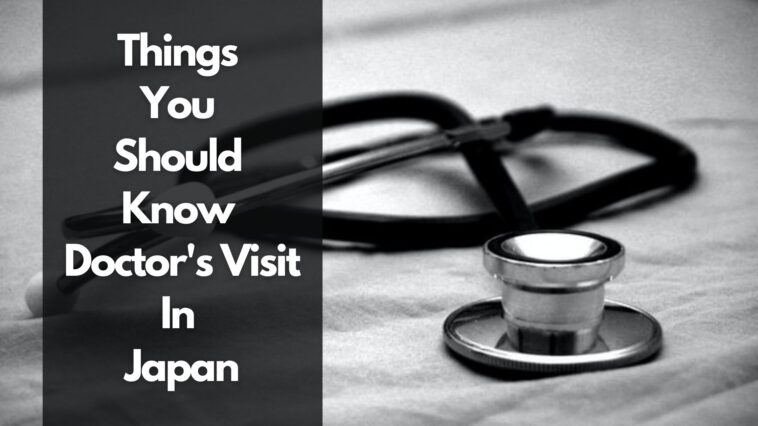Need to visit a doctor in Japan? Here’s what to know before visiting a doctor in Japan as a tourist! All the important information you need before you step into a Japanese hospital or clinic!
Getting sick can be worrying altogether, but that happening in a country you’re new to, in a place where you can’t communicate properly can be really taxing (literally also).
Here are a few tidbits of knowledge to arm yourself with before going for a doctor’s visit in Japan.
Language and cultural understanding of the medical healthcare system in Japan can be confusing.

When you’re visiting a doctor in Japan as a tourist (hopefully you won’t have to), make sure you have this checklist in hand: knowledge about health insurance, some useful hospital lingo to describe what’s happening to you, and a list of places where you can go.
It’s always safe to be prepared, isn’t it? Below you’ll find most of the necessary information you’ll need to get through a medical crisis in Japan.
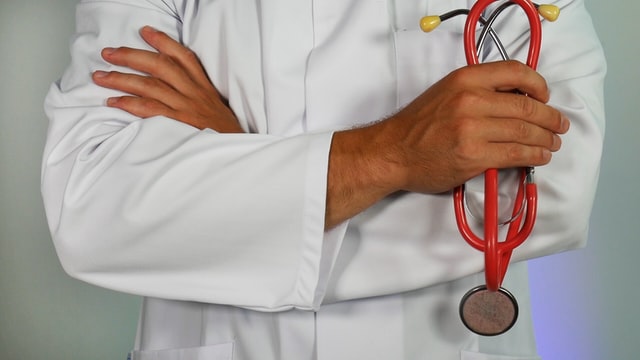
Before you panic (because that’s never good in medical emergencies: remember that we live in the age of a masterful Google translate).
Page Contents
What to Know Before Visiting a Doctor in Japan As A Tourist
A Brief Guide to Japanese Healthcare System and Health Insurance
The first thing we’ll talk about in this guide to what to know before visiting a doctor in Japan as a tourist is about the health insurance!
The Japanese health insurance is a bit extensive and detailed.
The first thing you need to know is that if you’re staying in Japan for more than 3 months, it is necessary that you enroll in the system even if you got yourself travel insurance or are covered by health insurance back home.

The reason being, most hospitals in Japan don’t accept those.
If you’ve entered Japan as a full-time employee, or are a resident of Japan with a full-time job, you’ll be enrolled in the shakai hoken (社会保険) of the company.
In this case, your pension and your health insurance are automatically deducted from your stipend.
In the case that you’re self-employed, work less than 30 hours a week or have no job, you must enroll yourself into Japan’s National Health Insurance — kokumin kenko hoken (国民健康保険). All you need to do is go to the city hall and fill the relevant forms.
Typically, being insured for health conditions in Japan means having to pay only 30% of your bill. The rest 70% of your bill is covered by your insurance.
When you leave the house, always make sure to carry your health insurance card in your wallet, or the next thing you know you’ll be emptying every last penny from your wallet. Healthcare in Japan can be pretty expensive.
Although that is true, the premium received on Japanese hospital bills changes depending on your age:
- For infants, 80% of their bill is covered by the insurance
- For children of the school-going age upto 69 years of age, 70% is covered.
- Adults between the ages of 70-74 only pay 10% of their bills,
- For the peak working population between the ages of 40 to 65, those of whom are residents, it is mandatory to pay 2% of the bill as a nursing care fee.
These are some of the things covered by the insurance in Japan:
- General medical check-ups
- Preventative care
- Injury due to an accident
- Hospital stays, including some meals
- Prescription medication
- Acupuncture and/or other therapy prescribed by a doctor
- Birth and prenatal costs
- Blood transfusion
- Dental care
What is not covered by the insurance
In the case of mental health conditions, buying contraception and other checkups that you seem needful but are not necessary, you’ll be charged the full bill as they are not covered by the insurance.
- Related: Cost of teeth whitening in Japan
- Related: Types of Teeth Whitening in Japan
- Related: What are Dental Braces costs in Japan
Understanding the Japanese Healthcare System As A Tourist
Travel Insurance: Your Safety Net
Before embarking on your journey to Japan, it’s strongly recommended to purchase comprehensive travel insurance that includes medical coverage.
This insurance can assist you in case of unexpected medical expenses, ensuring that you receive proper care without the burden of hefty bills. Make sure to thoroughly read your policy to understand what medical services are covered.
Identifying Medical Facilities In Japan
In Japan, medical facilities are categorized into several types, ranging from small clinics to large hospitals.
Hospitals are usually equipped to handle a wide range of medical issues, while clinics tend to cater to less severe ailments. When seeking medical attention, choose a facility that corresponds to the severity of your condition.
Language Barrier In Japan
While English is widely taught in schools and many Japanese people have a basic understanding of the language, the proficiency level can vary among healthcare professionals. To bridge the language gap, it’s wise to carry a medical phrasebook or a translation app.
Some major hospitals in popular tourist areas might have staff who can communicate in English, but don’t rely solely on this assumption.
Seeking Medical Care In Japan
When you require medical attention, consider the following steps:
- Consult Your Accommodation: The staff at your hotel or lodging can be valuable resources. They can help you find nearby medical facilities and even assist with making appointments or providing directions.
- Local Clinics and Hospitals: If you’re dealing with a minor ailment, visiting a local clinic might be sufficient. For more serious issues, head to a hospital.
- Emergency Services: In case of a medical emergency, dial 119 for an ambulance. While the operator might not speak English, they will dispatch help to your location.
- Pharmacies: If you need over-the-counter medication, look for pharmacies (known as “yakkyoku” in Japanese) that are often denoted by a green cross sign.
Payment and Costs Of Visiting A Doctor In Japan As A Tourist
The cost of visiting a doctor in Japan as a tourist will vary depending on the type of doctor you see, the treatment you receive, and whether or not you have health insurance.
- Costs for tourists with health insurance
If you have health insurance from your home country, you may be able to get some or all of the cost of your medical treatment in Japan reimbursed. However, you will need to check with your insurance company to see what their policy is for overseas medical care.
In general, the cost of a doctor’s visit in Japan with health insurance is around 30% of the total bill. This means that you would typically pay 30% of the cost of the consultation, any tests or procedures, and any medication you receive.
For example, if the total cost of your doctor’s visit is 10,000 yen, you would pay 3,000 yen out of pocket. The remaining 7,000 yen would be reimbursed by your insurance company.
- Costs for tourists without health insurance
If you do not have health insurance from your home country, you will be responsible for the full cost of your medical treatment in Japan. This can be very expensive, so it is important to have travel health insurance if you are planning to visit Japan as a tourist.
The cost of a doctor’s visit without health insurance in Japan can range from 5,000 to 10,000 yen. This is for the consultation fee only. Any tests or procedures, or medication you receive, will cost extra.
For example, if you need to see a doctor for a cold, you could expect to pay around 5,000 yen for the consultation. If you also need to get a prescription for medication, this could cost an additional 1,000 to 2,000 yen.
- Other costs to consider
In addition to the cost of the doctor’s visit, there are a few other costs you may need to consider if you need medical treatment in Japan as a tourist. These include:
- The cost of transportation to and from the doctor’s office or hospital.
- The cost of translation services, if you do not speak Japanese.
- The cost of accommodation, if you need to stay overnight in a hospital.
It is important to factor in all of these costs when planning your trip to Japan. This way, you will be prepared for any unexpected medical expenses that may arise.
How To Prescriptions and Medications In Japan As A Tourist?
If you require prescription medication, consult a healthcare professional. Some medications that are readily available in your home country might require a different prescription in Japan. Pharmacists can also provide information and guidance on the usage of medications.
Here are the steps on how to bring prescriptions and medications to Japan as a tourist:
- Check if your medication is allowed in Japan. Not all medications are allowed in Japan, so it is important to check with the Japanese Ministry of Health, Labour and Welfare (MHLW) before you travel. You can find a list of prohibited and controlled drugs on the MHLW website.
- Bring a copy of your prescription. You will need to bring a copy of your prescription for any medication you are bringing into Japan. This is to prove that you have a legitimate need for the medication and that it is not being brought into the country for illegal purposes.
- Bring a translation of your prescription. If your prescription is not in Japanese, you will need to bring a translation of it. This can be done by a professional translator or by a friend or family member who is fluent in Japanese.
- Declare your medication to customs. When you arrive in Japan, you will need to declare your medication to customs. This is to ensure that your medication is not prohibited or controlled. You will need to show the customs officer your prescription and translation, if applicable.
- Keep your medication in its original packaging. It is important to keep your medication in its original packaging when you are bringing it into Japan. This will make it easier for customs to identify the medication and to ensure that it is not prohibited or controlled.
- Do not bring more than a month’s supply of medication. You are only allowed to bring a month’s supply of medication into Japan. If you need more than a month’s supply, you will need to obtain a permit from the MHLW.
Vaccinations and Health Precautions
Before traveling to Japan, check if there are any recommended vaccinations. Additionally, be aware of any specific health precautions, such as avoiding tap water or being cautious with certain foods.
The following are the vaccinations and health precautions that are recommended for tourists to Japan:
- Routine vaccinations: Make sure you are up-to-date on all routine vaccinations, such as measles, mumps, rubella (MMR), polio, tetanus, diphtheria, and pertussis (TDaP).
- Hepatitis A: Hepatitis A is a liver infection that can be spread through contaminated food and water. It is recommended for all travelers to Japan, regardless of their itinerary.
- Hepatitis B: Hepatitis B is a liver infection that can be spread through blood and body fluids. It is recommended for travelers to Japan who are planning on having sex with a new partner, getting a tattoo or piercing, or coming into contact with blood or body fluids.
- Japanese encephalitis: Japanese encephalitis is a mosquito-borne virus that can cause brain inflammation. It is recommended for travelers to Japan who will be spending time in rural areas, especially during the summer months.
- Rabies: Rabies is a virus that can be spread through the bite of an infected animal. It is recommended for travelers to Japan who will be spending time outdoors, especially in rural areas.
- Other vaccines: Depending on your individual risk factors, your doctor may recommend other vaccines, such as tick-borne encephalitis or typhoid.
In addition to vaccinations, there are a number of other health precautions that you can take to stay healthy in Japan:
- Drink bottled water: Tap water in Japan is generally safe to drink, but it is always best to err on the side of caution and drink bottled water.
- Avoid raw seafood: Raw seafood is a popular dish in Japan, but it can be a source of food poisoning. If you are not sure if the seafood is cooked properly, it is best to avoid it.
- Be careful about what you eat: Be sure to wash your hands before eating and avoid eating food that has been left out in the open.
- Use insect repellent: Mosquitoes are a common insect in Japan and they can transmit diseases such as Japanese encephalitis. Be sure to use insect repellent when you are outdoors, especially during the summer months.
- Cover up: It is important to cover up when you are outdoors, especially in the sun. This will help to protect you from sunburn and skin cancer.
- Stay hydrated: It is important to stay hydrated when you are traveling, especially in hot weather. Drink plenty of water and avoid sugary drinks.
Cultural Considerations When Visiting A Doctor In Japan As A Tourist
Respect for cultural norms is essential. Arrive on time for your appointments, and if you need to cancel, do so with ample notice. Always carry identification, and be prepared to provide your travel insurance details.
Conclusion
Exploring Japan as a tourist can be an incredible adventure, but it’s essential to be prepared for unexpected health issues.
With thorough travel insurance, a basic understanding of the healthcare system, and a willingness to adapt to the local norms, you can ensure a smooth experience should the need for medical care arise.
By taking these precautions, you can focus on enjoying your trip while having the confidence that you’re well-equipped to handle any medical situation.
Basic Terminology to Know Before Visiting a Doctor in Japan As A Tourist
The next thing to discuss in this guide to what to know before visiting a doctor in Japan as a tourist is the basic terminologies you’re going to need to communicate with the doctor or hospital staff.
The first thing you should know about the healthcare vocabulary in Japan is that the term for hospital or a doctor’s clinic is the same. The term “byōin” encompasses large and small healthcare-providing establishments.
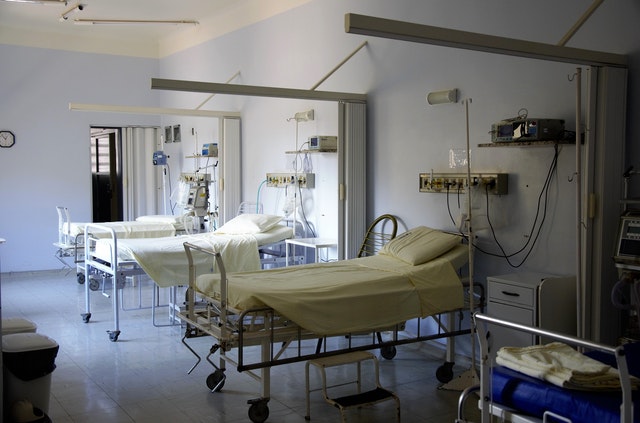
When you ask for an oisha san, you’re looking for a doctor. Just mention any of these two terms to your taxi driver and you’ll get to the nearest hospital.
Considering the state of Japanese hospitals, at least most of them, not knowing Japanese or being able to describe your condition or ailment in the language can leave you at a disadvantage. They won’t understand you and might diagnose you with something you’ve never even heard of.
Here’s some basic terminology you should equip yourself with before a visit to a doctor in Japan. It will help you get through the day at the hospitals there.
Describing the symptoms:
| English | Japanese |
| a cold | kaze |
| runny nose | hanamizu |
| cough | seki |
| headache | zutsū |
| dizziness | memai |
| fever | netsu |
Describing how bad the pain is:
| English | Japanese |
| very/really | totemo |
| a bit/a little | chotto |
Describing when it all began:
| English | Japanese |
| today | kyō |
| this morning | kesa |
| yesterday | kinō |
| last night | kinō no yoru |
| the day before yesterday | ototoi |
What To Do For Minor Injuries In Japan As A Tourist?
Next, in this guide to what to know before visiting a doctor in Japan as a doctor, I want to discuss some common ailments you might experience during your time in Japan.
Apart from some of the symptoms I have mentioned above, Japanese hospitals see this common list of minor ailments that may happen to you while you’re there.
- Flu: Infruenza can be experienced in Japan during early winters and late autumns. You can usually just go to the hospital and receive the annual flu vaccine. Just ask for the infruenza yobou sesshu.
- Food poisoning: Shokuchuudoku (食中毒) is not that common, but if you’re new to Japanese food, it’s always ready to be prepared.
- Urinary Infection: Boukouen, (膀胱炎). As a foreigner, you might be used to a higher dosage of medicines than the ones you get here. Therefore it is possible that if you’re afflicted with a urine infection, the light dosage that is common in Japan might not work on you.
What To do In Case of Emergencies In Japan?
Next, very important, this guide to what to know before visiting a doctor in Japan as a tourist will discuss what to do in case of emergencies
When you’re in a situation where you’re facing a medical emergency in Japan, remember that the number in Tokyo for ambulances is 119.
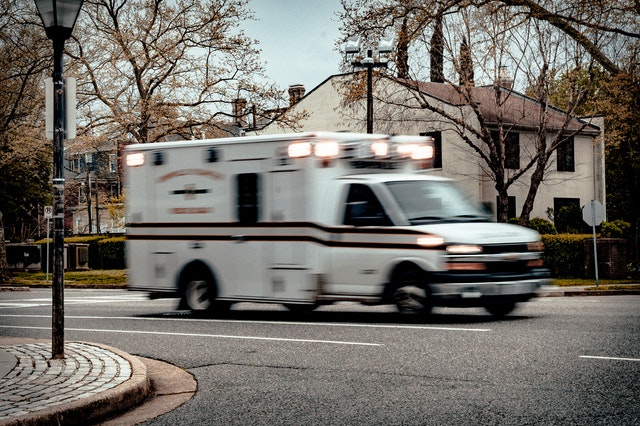
Another thing to remember is that the ambulances in Tokyo are handled by the fire department, so you will have to distinctly point out that you’re looking for an ambulance (kyuukyuusha, 救急車) and not reporting a fire (kaji, 火事).
The ambulances there are free, but you’ll have to be prepared in terms of what you’ll say when they take your call with regards to landmarks around you and what exactly happened.
For such reasons, the Tokyo fire department has even published an online guide that describes everything you might need to say during such emergencies.
Where can you find English Hospitals in Japan?
If you can’t speak or understand Japanese pay special attention to this part of the guide to what to know before visiting a doctor in Japan as a tourist!
If you live in a relatively large city like Osaka or Tokyo, finding a doctor that can communicate in English shouldn’t be a problem. These doctors often tend to publish a website in English as well.
But from experience and all the stories I’ve heard, I have often come to a worrisome dilemma. Doctor’s that speak English are not always good doctors. So, if you have something like a common cold that bugs you, feel free to go to one of those.
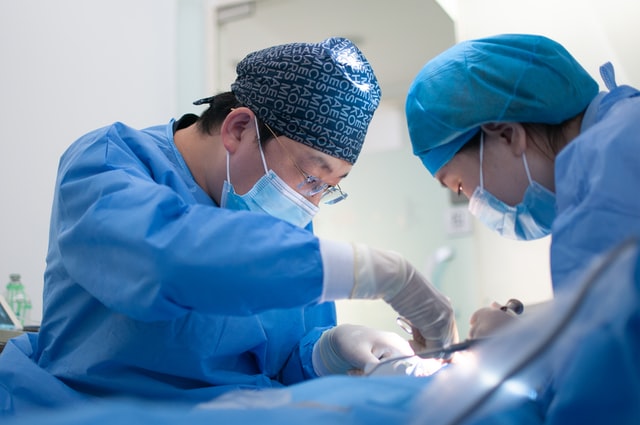
But if you have something serious that requires expertise, I’d recommend going to a specialist in the field (quite often can only speak in Japanese).
Nonetheless, there’s an expat community in Japan that has a recommended and approved list of English-speaking health organizations that can assist in times of medical needs.
Hospitals:
Insurance can be an issue when you’re from out of the country. Not many hospitals accept international health insurance. But there is one such Luke’s International Hospital, that not only accepts international health insurance but also has various English-speaking doctors with expertise in various disciplines.
General Information:
If you’re looking for information about what to do, where to do it, look for a specialist for your particular condition, Japan Healthcare Info can assist in that regard. On top of all that, they also help you make appointments, find the right doctor for you and give you recommendations for places where you can receive treatment in English.
Primary care:
Dr. Joe Kurosu is the Primary Care Shimokitazawa is the most common recommendation I’ve unanimously heard from the expat community. He is bilingual and has a reputed degree in medicine from Stanford. If you’re having health issues while you’re in Japan, I’d recommend stopping by here first and then getting a foreigner-friendly recommendation from Dr. Kurosu.
Sexually Transmitted Infections Testing:
Since this is not covered by health insurance, local or international, testing for STDs and STIs can be quite expensive. You don’t need an additional expense while you’re traveling.
You can head to the Shinjuku City Public Health Center for a free check-up on Thursdays. Make sure to find out which Thursdays because it happens only twice a month. Moreover, the center is multilingual. The testing is done in English, Portuguese, Spanish, and Thai.
Visiting A Doctor In Japan As A Tourist: FAQs
Can a tourist go to the doctor in Japan?
Yes, tourists can go to the doctor in Japan. The Japanese healthcare system is generally very good and tourists are welcome to use it.
If you need to see a doctor in Japan, you can either go to a clinic or a hospital. Clinics are typically smaller and less expensive than hospitals, but they may not have the same level of expertise. Hospitals are larger and more expensive, but they have a wider range of services and specialists.
To see a doctor in Japan, you will need to bring your passport and your health insurance card (if you have one). If you do not have health insurance, you will be responsible for the full cost of your medical treatment.
Once you are at the doctor’s office, you will need to fill out a medical history form. The doctor will then ask you about your symptoms and perform an examination. If necessary, the doctor may order tests or prescribe medication.
The cost of seeing a doctor in Japan will vary depending on the type of doctor you see, the treatment you receive, and whether or not you have health insurance. In general, you can expect to pay anywhere between 5,000 to 10,000 yen for a consultation at a clinic, and 10,000 to 15,000 yen at a hospital.
If you do not speak Japanese, you may want to ask your hotel or tour guide to recommend a doctor who speaks English. You can also search for English-speaking doctors online.
Can you go to the hospital in Japan without insurance?
Yes, you can go to the hospital in Japan without insurance. However, you will be responsible for the full cost of your treatment, which can be very expensive.
The cost of a hospital visit in Japan without insurance can range from 20,000 to 50,000 yen. This is for the consultation fee only. Any tests or procedures, or medication you receive, will cost extra.
If you are a tourist and you need to go to the hospital in Japan without insurance, you may be able to get your medical expenses reimbursed by your travel insurance company.
However, you will need to check with your insurance company to see if they cover medical expenses in Japan and to find out what their policy is for reimbursement.
Final Thoughts
Remember that you’re in a place that’s unfamiliar to you. It’s normal to have questions and in fact, it is better that you ask them as much as you have in mind to be clear of any discomfort you may face, mental and /or physical.
True, it is uncommon that someone in Japan would challenge the doctor’s recommendation and diagnosis, but if you have doubts in mind, go for a second opinion and weigh all the options you have.
After all, it is better to voice your concerns rather than face issues physically while burning a hole in your pocket.
Also Read


